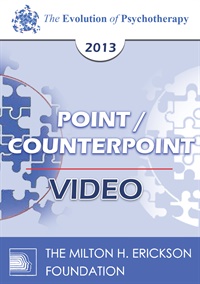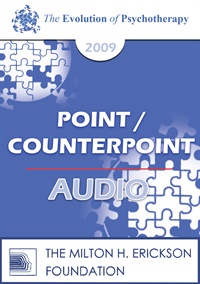
- Average Rating:
- Not yet rated
- Topic Areas:
- Point/Counterpoint Sessions | Narcissism | Personality Disorders | Psychotherapy
- Categories:
- Evolution of Psychotherapy | Evolution of Psychotherapy 2009
- Faculty:
- Otto Kernberg, MD
- Duration:
- 1 Hour 30 Minutes
- Format:
- Audio Only
- Original Program Date:
- Dec 09, 2009
- Short Description:
- Dr. Kernberg will present prognostically unfavorable indications for a psychodynamic psychotherapy of narcissistic patients, and the management of the corresponding difficulties. The description of general characteristics of narcissistic personality disorder, clinical syndromes including the diagnosis, and general principles of psychodynamic therapy for them will compliment this presentation.
- Price:
- $15.00 - Base Price
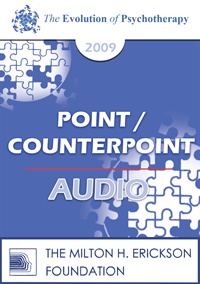
- Average Rating:
- Not yet rated
- Topic Areas:
- Point/Counterpoint Sessions | Life Focus Community | Psychotherapy | Religion
- Categories:
- Evolution of Psychotherapy | Evolution of Psychotherapy 2009
- Faculty:
- Erving Polster, PhD
- Duration:
- 1 Hour 28 Minutes
- Format:
- Audio Only
- Original Program Date:
- Dec 10, 2009
- Short Description:
- Psychotherapy, an originally private medical procedure, faces two immediate challenges: 1) an asocial pharmaceutical ethos and 2) its own populist success, which now call out for a more inclusive format. The latter represents a growing option for life-long large groups tapping the innermost sensibilities of people and creating the embodiment of belonging.
- Price:
- $15.00 - Base Price
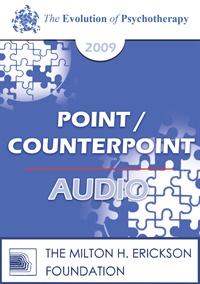
- Average Rating:
- Not yet rated
- Topic Areas:
- Point/Counterpoint Sessions | Psychotherapy | Genomics | Neuroscience
- Categories:
- Evolution of Psychotherapy | Evolution of Psychotherapy 2009
- Faculty:
- Ernest Rossi, PhD
- Duration:
- 1 Hour 3 Minutes
- Format:
- Audio Only
- Original Program Date:
- Dec 10, 2009
- Short Description:
- Revolutionary research in neuroscience and functional genomics documents show experiences of 1) Novelty, 2) Environmental Enrichment, and 3) Exercise (both mental and physical) can optimize gene expression, brain plasticity and mindbody healing during therapeutic hypnosis and meditation.
- Price:
- $15.00 - Base Price
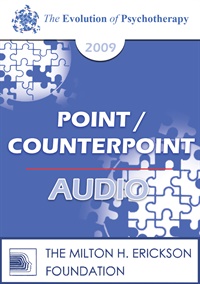
- Average Rating:
- Not yet rated
- Topic Areas:
- Point/Counterpoint Sessions | Social Issues | Psychotherapy
- Categories:
- Evolution of Psychotherapy | Evolution of Psychotherapy 2009
- Faculty:
- Albert Bandura
- Duration:
- 1 Hour 24 Minutes
- Format:
- Audio Only
- Original Program Date:
- Dec 10, 2009
- Short Description:
- This presentation addresses how otherwise good people can do cruel things. They do so through selective disengagement of moral self-sanctions from inhumane conduct. At the behavior locus, worthy ends are used to sanctify harmful means by social and moral justification. At the agency locus, people obscure personal responsibility by displacement and diffusion of responsibility. At the outcomes locus, the detrimental social effects of one’s actions are ignored, minimized, or disrupted. At the victim locus, perpetrators dehumanize and blame recipients for bringing the maltreatment on themselves. These mechanisms operate at both individual and social systems levels. Disengagement of moral agency is illustrated in the workings of the corporate world, terrorism, the use of military force, application of the death penalty, and in ecological destruction that is heating the planet and making it less habitable.
- Price:
- $15.00 - Base Price
Tags: Social Issues Psychotherapy
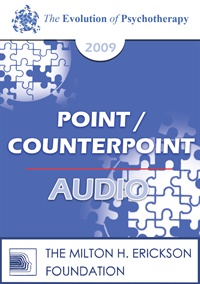
- Average Rating:
- Not yet rated
- Topic Areas:
- Point/Counterpoint Sessions | Psychotherapy | Therapist Development
- Categories:
- Evolution of Psychotherapy | Evolution of Psychotherapy 2009
- Faculty:
- David Barlow, PhD
- Duration:
- 1 Hour 33 Minutes
- Format:
- Audio Only
- Original Program Date:
- Dec 10, 2009
- Short Description:
- DSM-V will likely organize groups of disorders, including emotional disorders, along some as yet undecided dimensions. One possible scheme will be presented that collapses current DSM-IV emotional disorders into a single unified consideration of the dimensional severity of fundamental temperaments and key features shared, to some extent, by most emotional disorders with implications for psychological interventions.
- Price:
- $15.00 - Base Price
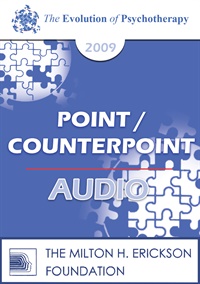
- Average Rating:
- Not yet rated
- Topic Areas:
- Point/Counterpoint Sessions | Art and Creativity | Psychotherapy | Therapist Development
- Categories:
- Evolution of Psychotherapy | Evolution of Psychotherapy 2009
- Faculty:
- Jeffrey Zeig, PhD
- Duration:
- 1 Hour 11 Minutes
- Format:
- Audio Only
- Original Program Date:
- Dec 12, 2009
- Short Description:
- Science measures, art impacts. We will study methods of impact used in various arts, including painting, music, writing, movies and dance. These methods can be applied in therapy where they can provide impact, making clinical work more experiential, more effective. A model will be offered and explained.
- Price:
- $15.00 - Base Price
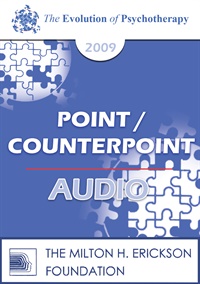
- Average Rating:
- Not yet rated
- Topic Areas:
- Point/Counterpoint Sessions | Suicide | Psychotherapy
- Categories:
- Evolution of Psychotherapy | Evolution of Psychotherapy 2009
- Faculty:
- James Hillman, PhD
- Duration:
- 1 Hour 23 Minutes
- Format:
- Audio Only
- Original Program Date:
- Dec 12, 2009
- Short Description:
- An expanded understanding of the suicidal urge, and reasoning, belongs to the capability of any therapist, since suicide is always a human potential. The therapist needs to come to terms with his/her own suicidal urges, fears and fantasies, and ideas of death as well. Objective reports – diagnosis, demographics, age groups, psychological situation, social history, personal styles, etc. may or may not help the practitioner in encountering the client’s risk of suicide.
- Price:
- $15.00 - Base Price
- Average Rating:
- Not yet rated
- Topic Areas:
- Psychology | Point/Counterpoint Sessions | Existential Therapy | Psychotherapy
- Categories:
- Evolution of Psychotherapy | Evolution of Psychotherapy 2013
- Faculty:
- Jean Houston, PhD | Ernest Rossi, PhD | Camillo Loriedo, MD, PhD
- Course Levels:
- Master Degree or Higher in Health-Related Field
- Duration:
- 1:23:46
- Format:
- Audio and Video
- Original Program Date:
- Dec 11, 2013
- Short Description:
- So many books and seminars have emerged over the last decade with discovering one’s “purpose” as their theme. What are the cultural and historic reasons for this, given the unique shifts and challenges of our time? How do we engender the passion for the possible in our human development while discovering what that “possible” is? Is it even possible to become an artist of destiny, capable of decoding the patterns, clues, and relationships that point you to a mystery that cannot be known directly? Ultimately when it comes down to our fascination with purpose, are we fooling ourselves or are we present at the birth of an opportunity that exceeds our imagination.
- Price:
-
Sale is $29.00
price reduced from Base Price - $59.00
- Average Rating:
- Not yet rated
- Topic Areas:
- Psychotherapy | Point/Counterpoint Sessions | Life Focus Community | Goals of the Therapist
- Categories:
- Evolution of Psychotherapy | Evolution of Psychotherapy 2013
- Faculty:
- Erving Polster, PhD | Jean Houston, PhD | Camillo Loriedo, MD, PhD
- Course Levels:
- Master Degree or Higher in Health-Related Field
- Duration:
- 1:28:45
- Format:
- Audio and Video
- Original Program Date:
- Dec 11, 2013
- Short Description:
- Huge numbers of people want to KNOW their lives as much as they want to CHANGE. This need to KNOW, long overshadowed in therapy by pathology, is evident every day in: ordinary conversation, the arts, the mindfulness movement and religion. History now calls for therapy’s attention to basic themes of living through the design of Life Focus Communities.
- Price:
-
Sale is $29.00
price reduced from Base Price - $59.00
- Average Rating:
- Not yet rated
- Topic Areas:
- Point/Counterpoint Sessions | Psychotherapy | Therapist Development
- Categories:
- Evolution of Psychotherapy | Evolution of Psychotherapy 2013
- Faculty:
- David Barlow, PhD | Francine Shapiro, PhD | Betty Alice Erickson, MS, LPC, LMFT
- Course Levels:
- Master Degree or Higher in Health-Related Field
- Duration:
- 1:24:49
- Format:
- Audio and Video
- Original Program Date:
- Dec 11, 2013
- Short Description:
- Neurotic disorders dominated the landscape of psychopathology for almost a century before dying a sudden and traumatic death in 1980 with the publication of the DSM III. Now researchers delineated empirically supported common dimensions shared by all anxiety, mood, and related emotional disorders, including higher order temperaments, mood distortions, and extensive patterns of avoidance. In this presentation Barlow suggests a new integrated diagnostic scheme and the identification of psychological treatment principles targeting temperament directly.
- Price:
-
Sale is $29.00
price reduced from Base Price - $59.00
Please wait ...



